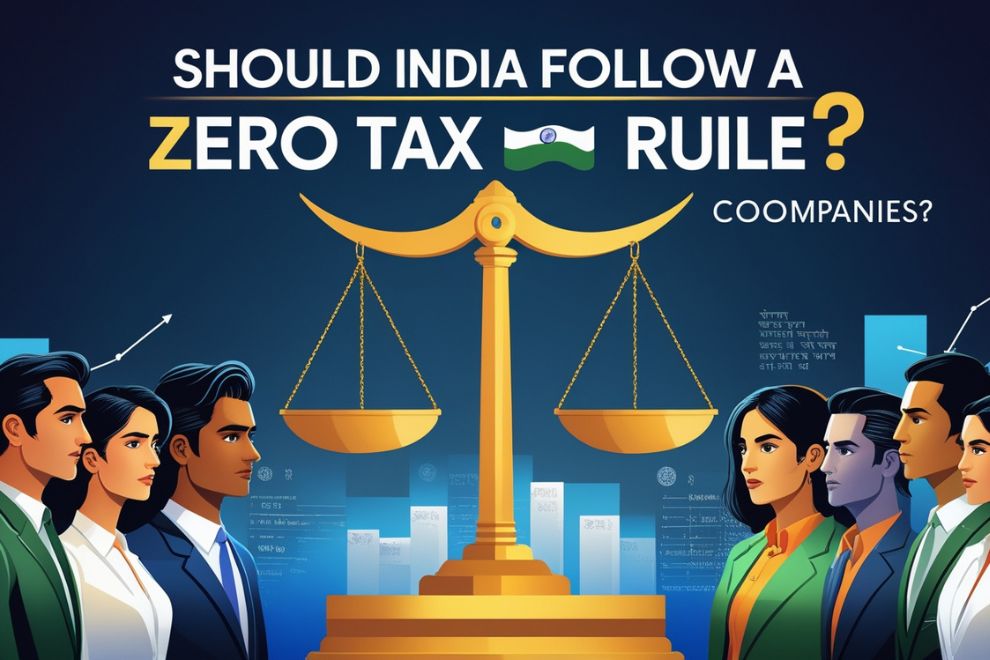In today’s fast-paced global economy, the debate over taxation policies is ever-present. One controversial proposition is whether India should adopt a zero tax rule for companies—a model some other nations or specific companies appear to follow—to stimulate growth and attract investment. This article will explore the multifaceted arguments surrounding this idea, examine global precedents, and analyze whether such a policy could be beneficial or detrimental for India’s economy. With a comprehensive look at economic theory, international case studies, and the unique challenges of the Indian market, we aim to provide a balanced perspective on this provocative question.
Understanding the Zero Tax Rule
A zero tax rule essentially means that companies would not be subject to corporate income taxes. Instead, governments might rely on alternative revenue sources such as indirect taxes, consumption taxes, or other fees. Proponents argue that eliminating corporate taxes can create a more attractive business environment, spur investment, and increase competitiveness. Critics, however, point to the potential loss of public revenue and the risk of widening income inequality if tax burdens shift disproportionately to other sectors or the general public.
Key Concepts
- Corporate Tax Exemption: Companies enjoy complete or significant tax relief on their earnings.
- Alternative Revenue Models: Government revenues could be maintained or increased through consumption taxes, value-added taxes (VAT), or fees.
- Economic Growth and Investment: Reduced tax burdens may lead to higher corporate investment, innovation, and employment generation.
Global Perspectives: Lessons from Other Countries
Globally, several countries have experimented with low or zero corporate tax regimes, albeit often in a limited or nuanced fashion. For example, some tax havens and special economic zones (SEZs) offer near-zero tax rates to attract multinational corporations and foster investment. While these regions may enjoy short-term economic booms, the long-term sustainability of such policies is widely debated.
Examples of Low or Zero Tax Regimes
- Tax Havens: Countries like Bermuda, the Cayman Islands, and the Bahamas have low or zero corporate taxes, attracting multinational companies seeking tax optimization. However, these jurisdictions also face criticism for facilitating tax avoidance.
- Special Economic Zones: Countries such as China and the United Arab Emirates have established zones where companies can enjoy reduced or zero corporate tax rates. These zones have sometimes led to rapid industrialization and job creation, though benefits are often localized rather than nation-wide.
- Innovation Clusters: Some regions offer tax incentives or holidays to promote technology and innovation clusters, arguing that the long-term economic benefits outweigh the short-term tax revenue loss.
The Potential Benefits of a Zero Tax Regime for India
1. Attracting Foreign Direct Investment (FDI)
One of the strongest arguments in favor of a zero tax rule is the potential to attract substantial foreign direct investment. By offering an attractive fiscal environment, India could position itself as a competitive destination for multinational corporations looking to minimize tax liabilities. Increased FDI can lead to technology transfers, improved infrastructure, and overall economic modernization.
2. Boosting Domestic Investment and Innovation
Domestic companies might also benefit from the absence of corporate tax burdens. With more capital available for reinvestment, businesses can expand their operations, invest in research and development, and create new job opportunities. This reinvestment could spur innovation and increase the global competitiveness of Indian companies.
3. Simplifying the Tax Structure
Implementing a zero tax rule could lead to a simplified tax regime. Reducing complexity in the tax code can lower compliance costs for businesses and reduce administrative burdens on the government. A streamlined system might also reduce tax evasion and improve overall transparency.
4. Encouraging Economic Growth
Economic theory often suggests that lower taxes can lead to higher economic growth by freeing up capital for private investment. A zero tax rule might stimulate economic activity across sectors, resulting in increased productivity and higher overall GDP growth. This growth could create a positive cycle of higher employment and consumer spending.
Potential Risks and Drawbacks
1. Revenue Shortfalls for Public Services
Perhaps the most significant risk of adopting a zero tax rule is the potential loss of revenue for critical public services. India’s vast population depends on government spending for healthcare, education, infrastructure, and social welfare programs. Without corporate taxes, the government would need to identify alternative revenue streams, which might lead to higher indirect taxes or reduced public spending.
2. Risk of Increased Economic Inequality
Eliminating corporate taxes could exacerbate income inequality if the tax burden shifts to consumers and small businesses. Wealthy corporations might thrive, while the average citizen could face higher prices for goods and services due to increased indirect taxes. This redistribution might lead to social discontent and widen the gap between different economic classes.
3. Potential for Tax Avoidance and Evasion
Even in a zero tax environment, there is a risk that companies could engage in complex financial maneuvers to shift profits to jurisdictions with favorable tax treatments. This dynamic could create an uneven playing field and might not necessarily translate into broader economic benefits. Furthermore, if the policy is not carefully designed, it may encourage other forms of tax avoidance that undermine the overall tax system.
4. Challenges in Implementing Alternative Revenue Models
To counterbalance the loss of corporate tax revenue, the government would need to bolster alternative revenue sources. Transitioning to reliance on indirect taxes or fees could be challenging, especially in a diverse economy like India’s. Any abrupt changes could lead to public backlash and economic instability during the transition period.

The Indian Context: Unique Considerations
1. Economic Diversity and Scale
India’s economy is incredibly diverse, with a large informal sector and significant regional variations. While a zero tax rule might work well in a highly developed, homogeneous economy, India’s unique challenges mean that a one-size-fits-all approach could have unintended consequences. Tailored policies that consider both urban and rural dynamics are essential.
2. Current Fiscal Pressures
India faces substantial fiscal pressures, including funding for social programs, infrastructure, and healthcare. The revenue generated from corporate taxes forms a crucial part of the government’s budget. Transitioning to a zero tax regime would require significant restructuring of fiscal policies and could lead to short-term disruptions in public services.
3. Global Competitive Environment
While India is competing with nations that offer low corporate tax rates, it also benefits from other factors such as a vast labor pool and a growing consumer market. Therefore, the decision to adopt a zero tax rule should be made in the context of a broader strategy that leverages India’s inherent strengths rather than relying solely on tax incentives.
4. Social and Political Implications
Taxation is not just an economic tool but also a reflection of social contract. Eliminating corporate taxes could be perceived as favoring large corporations at the expense of the common citizen. Policymakers must consider the political ramifications of such a move, ensuring that any changes promote fairness and do not lead to social unrest.
Balancing Innovation and Public Welfare
Adopting a zero tax rule is not simply a matter of eliminating a fiscal burden; it is a strategic decision that requires balancing the needs of businesses with the imperative of maintaining robust public services. For India, the challenge lies in fostering an environment that encourages innovation and investment while ensuring that economic gains are widely shared.
Alternative Approaches
- Selective Tax Holidays: Instead of a blanket zero tax rule, India could consider offering temporary tax holidays or incentives for specific sectors such as technology, renewable energy, or manufacturing. This targeted approach can stimulate growth in strategic areas without jeopardizing overall fiscal stability.
- Gradual Reduction and Reinvestment: A phased reduction in corporate tax rates, coupled with policies to reinvest the savings into social infrastructure, may help balance the benefits of a lower tax burden with the need for sustained public investment.
- Broadening the Tax Base: Rather than eliminating corporate taxes entirely, efforts could be made to broaden the tax base by reducing loopholes and improving compliance. This strategy might achieve the dual goals of increased investment and equitable revenue collection.
The question of whether India should follow a zero tax rule for companies is complex and multifaceted. On one hand, a zero tax regime could potentially attract foreign investment, stimulate domestic innovation, and simplify the tax structure, leading to increased economic growth. On the other hand, the risks of revenue shortfalls, increased inequality, and implementation challenges cannot be overlooked.


